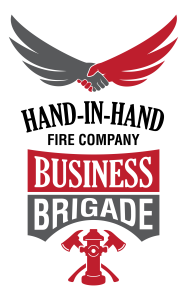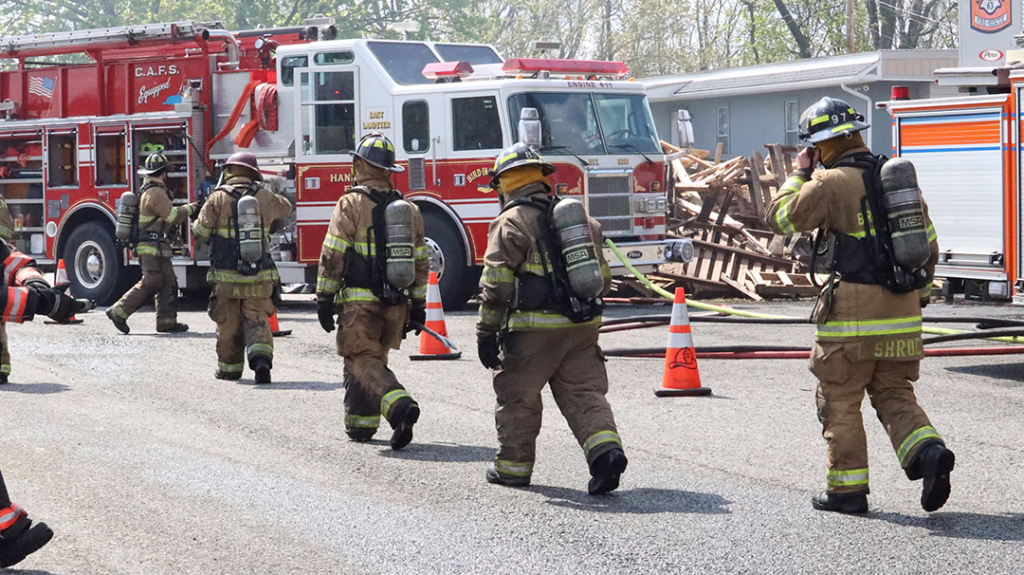“I’m super grateful for where I work, because the owner allows me to respond to calls,” says firefighter Christian Miller. If not for the policy of local employers like firefighter Miller’s, who lets workers “run calls” while on duty, it’s not certain there would still be a Hand-in-Hand Fire Company.
Since the granting of its 1910 charter, the 114-year-old fire company has been comprised of an all-volunteer firefighting force. Since fires and emergencies don’t just happen after work hours, there are local businesses, in support of this vital community service, that allow their staff to respond to calls during work hours.
With the right framework in place, any local business can do the same—and reap the benefits that come with investing in their community in this essential way. “If it’s managed well, it can work,” states Fire Company President Paul Fisher. “And it’s definitely a huge benefit to the Fire Company. As time has gone on, we’ve gotten more calls, and daytime is traditionally the most difficult time to get volunteers to come out because of their employment, so it’s something that’s pretty important to us.”
Pitching in to Protect
All businesses in the local area benefit from the labor and skill of the dedicated volunteer fire company—who in turn are supported by the Business Brigade: an exclusive group of nearly 20 dedicated business that allow their workers to respond to fire calls.
“It’s a pretty simple calculation,” says Lonnie Kauffman, a longtime firefighter and local businessperson who allows workers from his two companies, Kauffman Orchards and Greystone Manor, to run calls. “If my neighbor’s business would burn, I would go help them. But if my business burns, [the fire station] is going to come help us.”
Because of the assured response from the local fire station to all commercial and business addresses within their area of response, it’s up to businesses to support the fire company in turn. “It doesn’t need to be the business owner himself,” Kauffman points out. “But if they can let one or two people run fire calls during business hours and pay that person, then they’re contributing; because again, the fire company is going to respond to any business in the area, whether or not they support the fire company.”
Benefits to Business
Such a practice is also beneficial to businesses. Aside from the rational self-interest in contributing to a vital service provided by others (tax-free, to boot), instilling such a policy has other distinct advantages, from attracting high-quality workers to forging a company culture focused on duty and responsibility.
“It can actually act as a recruitment tool,” says Gerald Petersheim of JR Metal, a local company that’s allowed workers to run calls since its 1997 founding by John Petersheim, a former Hand-in-Hand firefighter. “Being able to run calls is a perk for the active firefighters. If they have a choice between two jobs—one that lets them run calls and one that doesn’t—that could be enough to make them choose one over the other.”
Frontline firefighters are a dedicated group, highly trained in emergency response, firefighting and first aid, among other skills. They’re also trained to remain calm under intense pressure and proceed rationally, no matter the situation. Such is a skillset is desired in any line of business, and it’s one that, in the case of firefighters and other emergency personnel, is always expanding. “It helps them to grow, and helps to round out their character,” says Petersheim of those running calls. Plus, it never hurts to have trained emergency and fire personnel on the premises.
The policy also helps a company—and a community—thrive. “It creates a culture within your business of giving, and serving within your community,” Petersheim describes. “That has a benefit in the business because employees see the sacrifice that both the employer and employee are making for somebody else.”
In this case, ‘somebody else’ is the community at large. Any company that permits employees to answer fire calls is directly aiding one of its most vital emergency services. “A lot of our businesses are very community-oriented,” explains Fisher. “It’s a big part of what they stand for, so it allows them to really offer something tangible back to the community.”
The tangible part becomes more evident when one realizes the significant line-item savings businesses see on their annual tax bills, due to the fact that the local fire company is a volunteer one. “It’s actually an easy way to support the community that you live in, or that you have a business in,” explains Amy Sweitzer of Glick Fire Equipment, a local company that has allowed employees to run calls for decades.
By adding your firm to the list of local companies that allow employees to respond to fire calls, you’re lightening the load for the small number of participating companies who are single handedly carrying the load. “As a business owner, you have a lot of different things you’re juggling,” says Fisher. “You need to run a profitable company in order to provide jobs and make a living. But then you also want to help strengthen the community, the families of your employees, and your customers. So with this, it’s a package deal.”
Interested in allowing workers to respond to fire calls? Here’s how to structure a policy that will best suit your business—while benefiting from having a workforce staffed with firefighters.
Utilize the Duty Crew System
“We’ve set up a system where each employer and each volunteer can have a duty crew schedule set up,” says President Fisher, who enables employees at his company, Beechdale Frames, to run calls. The flexible system is ideal because it allows companies to set its own terms when it comes to who can run calls, when they can run calls and how often.
To set up a duty crew system, implement any of the following:
Determine specific days of the week (such as Tuesdays only, or Mondays and Thursdays, for example) that employees can run calls. Given the flexibility of the duty crew system, an employer can even select half-days.
Determine specific weeks of the month (such as the 2nd or 3rd week of every month, for example) that employees can run calls. An employer whose business is seasonal, for instance, can even designate specific times of the year that employees can respond to calls.
Utilize a rotation system that determines when specific employees can run calls.
In the case of Beechdale Frames, Fisher explains: “We’ve got two guys right now who are active firefighters. So we have certain days—it might be a day or two each week—where we know who’s leaving if there’s a fire call. If we get a call on Monday, for instance, the one guy on duty will leave, and the other one will stay so it doesn’t wipe out our manpower.”
“I can set my work schedule based on my duty crew schedule, and that works pretty well,” adds Lonnie Kauffman, a local businessperson and firefighter.
To Compensate or Not—You Choose
In terms of compensating a worker while they are out running a fire call, it’s up to each company to choose whether it will be at 0%, 100%—or somewhere in-between.
“Just because you’re letting someone go doesn’t mean you necessarily have to pay them for when they’re gone,” points out Amy Sweitzer of Glick Fire Equipment. “There can be a half-and-half arrangement.” For example: If an employee is gone for two hours, the company may elect to cover half of the worker’s wages while on a fire call. “That way,” the employer adds, “they have buy-in, too.”
Another option is to pay a worker for the first hour spent responding to a fire. Or, in the case of an hourly worker who runs calls, allowing that individual schedule flexibility so he or she can make up missed hours at another time.


Hand-in-Hand Fire Company, and the entire community, thanks these local companies that allow employees and staff to run calls during work hours
© 2024 All Rights Reserved